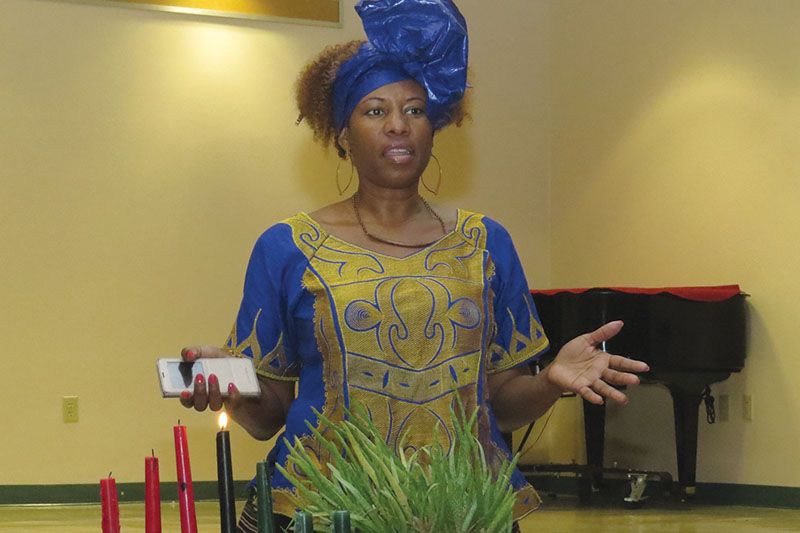BY ALLEN A. BUCHANAN, Staff Writer
ST. PETERSBURG — The auditorium was packed New Year’s night at the Enoch Davis Center for the culmination of the seven-day Kwanzaa celebration. Community members of all ages and walks of life came out to commemorate 49 years of celebrating the harvest.
A relatively new holiday, Kwanzaa is celebrated from Dec. 26 – Jan. 1 and was created in 1966 by Dr. Maulana Karenga, a professor of Black Studies at California State University.
After the Los Angeles Watts riots, which lasted six days and resulted in 34 deaths and thousands of injuries, Karenga searched for a way to bring African Americans together as a community. His research led him to the “first fruit” harvest celebrations of the Ashanti and Zulu people of Africa and the framework of Kwanzaa was born.
Kwanzaa celebrates what Karenga called the seven principles of Kwanzaa, or Nguzo Saba—the seven principles of African Heritage.
Last Friday’s drum call reflected the diversity of the community as drummers ranging in age from elementary school students to senior griots welcomed the residents with polyrhythmic African beats.
Brother Shabazz Rogers, Jr. hosted the festive event where symbols of the seven principals of Kwanzaa could be found. An African decorative mat (Mkeka) on which other symbols are placed; corn (Mahindi) and other crops; a candle holder with seven candles (Mishumaa Saba), a communal cup for pouring libation (Kikombe cha Umoja), gifts (Zawadi), a poster of the seven principles and a black, red and green flag were all present.
During the invocation, everyone shouted out the name of a relative or noteworthy historical public figure that has transitioned to a higher realm.
The eldest citizen in attendance, Mother Talbert, spoke briefly about the south side community banding together to support and promote economic independence. Most importantly, she touched on the importance of parents and community coming together to ensure our children receive a quality education.
“This has deteriorated since the inception of integration,” said Talbert.
Mama Lubaba punctuated the essence of what Kwanzaa is about in her presentation “All About Kwanzaa.” She spoke of how Karenga felt that the African-American community needed an economic as well as cultural framework based on their traditions to reach the pentacle of spiritual and financial success.
Mother Talbert exemplified the embodiment of Nguzo Saba by baking and contributing three Kwanza cakes and other delicious fare to the celebration. The Kwanzaa cakes with the seven principles written on them were community favorites.
Young people 12 years old and under dazzled the audience as they read five of the seven Kwanzaa principles. This group of youngsters was seen as hope, for they have the potential to develop into future educators, pacesetters, artists and community leaders.
One of the most sacred parts of the Kwanzaa celebration is the “pouring of libation” to honor ancestors far and near who have impacted lives through their love of family, strength of character and urgency of due diligence. As Rogers prepared to pour the water over a potted palm, he invited everyone to share the name of someone close to them who has transitioned to a higher realm but still remain attached spiritually to them throughout their lives.
The weeklong Kwanzaa celebration culminated with the African feast called the Karamu (feast).
Nguzo Saba: The Seven Principles of Kwanzaa
-
Umoja- The health and possibilities of the family and community, therefore, is dependent upon the quality of relationship within the family and community.
-
Kujichaguila- The need for shared cultural values, symbols, rituals, and practices in order to give African American families and children meaning, value, identity and community.
-
Ujima- teaches each family member to recognize that their own well-being is derived from their family and community.
-
Ujamaa- Empowers families and communities to come together around their collective economic interest and to see their economic strength in co-opt owing and buying.
-
Nia- Instructs each family member to see him or herself as linked to the larger project of nation building.
-
Kuumba – demands continuous improvement in personal and family and social matters.
-
Imani- teaches personal and collective efficacy.





